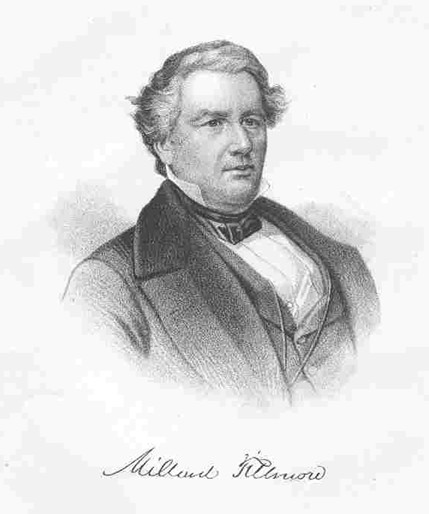
|
Carroll County IAGenWeb |
of
GREENE and CARROLL COUNTIES, IOWA
The Lewis Publishing Company, 1887
Transcribed by Sharon Elijah January 8, 2021

|
Carroll County IAGenWeb |
Transcribed by Sharon Elijah January 8, 2021
 |
MILLARD FILLMORE, the thirteenth President of the United States, 1850-’3, was born in Summer Hill, Cayuga County, New York, January 7, 1800. He was of New England ancestry, and his educational advantages were limited. He early learned the clothiers’ trade, but spent all his leisure time in study. At nineteen years of age he was induced by Judge Walter Wood to abandon his trade and commence the study of law. Upon learning that the young man was entirely destitute of means, he took him into his own office and loaned him such money as he needed. That he might not be heavily burdened with debt, young Fillmore taught school during the winter months, and in various other ways helped himself along.At the age of twenty-three he was admitted to the Court of Common Pleas, and commenced the practice of his profession in the village of Aurora, situated on the eastern bank of the Cayuga Lake. In 1825 he married Miss Abigail Powers, daughter of Rev. Lemuel Powers, a lady of great moral worth. In 1825 he took his seat in the House of Assembly of his native State, as Representative from Erie County, whither he had recently moved.
Though he had never taken a very active part in politics his vote and his sympathies were with the Whig party. The State was then Democratic, but his courtesy, ability and integrity won the respect of his associates. In 1832 he was elected to a seat in the United States Congress. At the close of his term he returned to his law practice, and in two years more he was again elected to Congress.
He now began to have a national reputation. His labors were very arduous. To draft resolutions in the committee room, and then to defend them against the most skillful opponents on the floor of the House requires readiness of mind, mental resources and skill in debate such as few possess. Weary with these exhausting labors, and pressed by the claims of his private affairs, Mr. Fillmore wrote a letter to his constituents and declined to be a candidate for re-election. Notwithstanding this communication his friends met in convention and renominated him by acclamation. Though gratified by this proof of their appreciation of his labors he adhered to his resolve and returned to his home.
In 1847 Mr. Fillmore was elected to the important office of comptroller of the State. In entering upon the very responsible duties which this situation demanded, it was necessary for him to abandon his profession, and he removed to the city of Albany. In this year, also, the Whigs were looking around to find suitable candidates for the President and Vice-President at the approaching election, and the names of Zachary Taylor and Millard Fillmore became the rallying cry of the Whigs. On the 4th of March, 1849, General Taylor was inaugurated President and Millard Fillmore Vice-President of the United States.
The great question of slavery had assumed enormous proportions, and permeated every subject that was brought before Congress. It was evident that the strength of our institutions was to be severely tried. July 9, 1850, President Taylor died, and, by the Constitution, Vice-President Fillmore became President of the United States. The agitated condition of the country brought questions of great delicacy before him. He was bound by his oath of office to execute the laws of the United States. One of these laws was understood to be, that if a slave, escaping from bondage, should reach a free State, the United States was bound to do its upmost to capture him and return him to his master. Most Christian men loathed this law. President Fillmore felt bound by his oath rigidly to see it enforced. Slavery was organizing armies to invade Cuba as it had invaded Texas, and annex it to the United States. President Fillmore gave all the influence of his exalted station against the atrocious enterprise.
Mr. Fillmore had serious difficulties to contend with, since the opposition had a majority in both Houses. He did everything in his power to conciliate the South, but the pro-slavery party in that section felt the inadequacy of all measures of transient conciliation. The population of the free States was so rapidly increasing over that of the slave States, that it was inevitable that the power of the Government should soon pass into the hands of the free States. The famous compromise measures were adopted under Mr. Fillmore’s administration, and the Japan expedition was sent out.
March 4, 1853, having served one term, President Fillmore retired from office. He then took a long tour through the South, where he met with quite an enthusiastic reception. In a speech at Vicksburg, alluding to the rapid growth of the country, he said:
“Canada is knocking for admission, and Mexico would be glad to come in, and without saying whether it would be right or wrong, we stand with open arms to receive them; for it is the manifest destiny of this Government to embrace the whole North American Continent.”
In 1855 Mr. Fillmore went to Europe where he was received with those marked attentions which his position and character merited. Returning to this country in 1856 he was nominated for the Presidency by the “Know-Nothing” party. Mr. Buchanan, the Democratic candidate was the successful competitor. Mr. Fillmore ever afterward lived in retirement. During the conflict of civil war he was mostly silent. It was generally supposed, however, that his sympathy was with the Southern Confederacy. He kept aloof from the conflict without any words of cheer to the one party or the other. For this reason he was forgotten by both. He died of paralysis, in Buffalo, New York March 8, 1874.
~ * ~ * ~ * ~ * ~